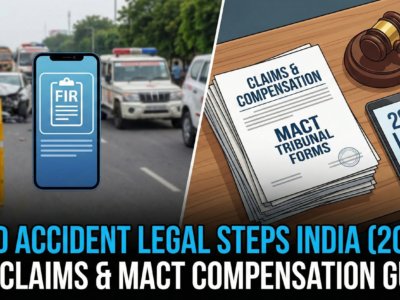Step-Child Inheritance & Property Rights in India | Legal Templates
Navigating property rights within blended families presents a unique set of legal challenges in India. A common and critical question is whether a step-child can inherit a step-parent’s property. The short answer, under Indian succession law, is no—not automatically. Inheritance is governed by consanguinity (blood relations), and without a specific legal provision like a Will, a step-child is considered a legal stranger to their step-parent’s estate. This guide provides a definitive legal analysis of a step-child’s property rights across Hindu, Muslim, and Christian law, exploring the crucial remedies like testamentary succession (Wills), legal adoption, and other estate planning tools that are essential to ensure your intentions are legally protected.
An Exhaustive Legal Analysis of Step-Sibling Property Rights in India
A Definitive Guide for Blended Families (Updated September 2025)
Authored by: Evaakil.com Legal Research Team
Executive Summary
The law in India is unequivocal: under the default rules of intestate succession (dying without a Will), step-siblings have no automatic right to inherit property. This principle holds true across all major personal laws, including Hindu, Muslim, and Christian law. Inheritance rights are fundamentally based on consanguinity (blood relationship), a link that step-relatives do not share by law.
A step-child's relationship with a step-parent is one of affinity (by marriage), not blood. Consequently, they are not considered legal heirs. This exclusion forms a legal barrier, preventing any automatic inheritance claims between step-siblings regarding a step-parent's estate.
However, this legal default can be overcome. A step-parent can secure a step-child's inheritance through two primary methods: a legally valid Will (Testamentary Succession) or by completing a Formal Legal Adoption, which grants the step-child the full legal status of a biological child.
I. Foundational Principles of Indian Succession Law
The right to inherit property in India operates on a dual system: succession by a person's expressed wishes through a Will, and succession by default rules set by law. Understanding this distinction is crucial for blended families.
Testamentary vs. Intestate Succession: A Clear Demarcation
Testamentary Succession is governed by a valid Will. This allows a person (the "testator") to distribute their self-acquired assets according to their personal wishes, overriding the default rules. A Will is the most powerful tool for a step-parent to bequeath property to a step-child.
Intestate Succession applies when a person dies without a valid Will. In this case, their property is distributed among relatives in a strict, hierarchical order defined by their applicable personal law (e.g., The Hindu Succession Act). Step-children are not recognized as legal heirs in this framework.
Defining Familial Relationships: Legal Weight of Labels
Legal Definitions in Family Law
In succession law, relationships are defined by blood or legal decree, not just emotion.
Step-Siblings
Connected only by parents' marriage. No shared bloodline. Not recognized as legal heirs for intestate succession.
Half-Siblings
Share one common biological parent. Recognized as legal heirs, though often with a lower preference than full-blood siblings.
Adopted Siblings
Connected by a formal legal decree of adoption. Treated as full biological siblings for all legal purposes, including inheritance.
The law's explicit recognition of half-siblings (e.g., Section 18 of the Hindu Succession Act) compared to its complete silence on step-siblings is interpreted by courts as a deliberate exclusion, emphasizing the primacy of biological lineage.
II. The Hindu Succession Act, 1956
This Act, governing Hindus, Buddhists, Jains, and Sikhs, establishes a clear hierarchy of heirs. Step-children are absent from all classifications.
Exclusion from Heir Classifications (Class I & Class II)
The Act lists primary heirs in "Class I" (spouse, sons, daughters, mother) who inherit first and equally. If no Class I heirs exist, the property goes to "Class II" heirs (father, siblings, etc.). The terms "son" and "daughter" have been judicially interpreted to mean only biological or legally adopted children. A step-child is not included in Class I, Class II, or any subsequent category of heir, making them a legal stranger to their step-parent's estate.
Implications for Self-Acquired vs. Ancestral Property
- Self-Acquired Property: Property earned or received as a gift by an individual. The owner has absolute rights to bequeath this via a Will to anyone, including a step-child.
- Ancestral/Coparcenary Property: Property inherited through up to four generations of male lineage. A right in this property is acquired by birth only by blood relatives (coparceners). A step-child has no right whatsoever in ancestral property.
III. Judicial Interpretation: The Courts' Stance
The judiciary has consistently reinforced the exclusion of step-children from intestate succession.
The definitive ruling is from the Supreme Court in *Lachman Singh v. Kripa Singh*. The Court held that the terms "son" and "daughter" in the Hindu Succession Act do not include "step-son" or "step-daughter." It reasoned that if Parliament had intended to include them, it would have used express language, especially since this would be a major departure from traditional law.
This precedent has been firmly followed by High Courts across India, solidifying the legal position. The courts often refer to the General Clauses Act, 1897, which defines "son" to include an adopted son but makes no mention of a step-son, further supporting this narrow interpretation.
IV. Inheritance under Muslim & Christian Law
Muslim Personal Law (Shariat)
Islamic inheritance law is also strictly based on blood ties. Heirs are categorized as Sharers, Residuaries, or Distant Kindred. A step-child does not fall into any of these categories. Furthermore, Islamic law does not recognize adoption for inheritance purposes. The only recourse is a Will (*Wasiyat*), but a Muslim can only bequeath a maximum of one-third of their estate to a non-heir (like a step-child) without the consent of their blood-related legal heirs.
The Indian Succession Act, 1925 (Christians, Parsis, etc.)
This secular law, which applies to Christians, Parsis, Jews, and those married under the Special Marriage Act, is also based on consanguinity. It defines heirs as "lineal descendants" or "kindred" (sharing a common ancestor). A step-child is neither. The rules for Parsis are particularly telling: they explicitly mention and rank half-siblings but completely omit step-siblings, confirming their deliberate exclusion.
Interactive Chart: Will vs. Adoption Effectiveness
Compare the legal strength and certainty of different methods to secure a step-child's inheritance across personal laws.
VI. Legal Remedies & Pathways for Inheritance
While automatic rights are non-existent, a step-parent who wishes to provide for a step-child has several powerful legal tools at their disposal. The choice of instrument is crucial.
1. Testamentary Disposition: The Will as the Paramount Instrument
A Will is the most direct way to bypass intestate succession laws. A step-parent can name a step-child as a beneficiary for any portion of their self-acquired property. To be valid, it must be in writing, signed by the testator, and attested by two witnesses. While registration is not mandatory, it is highly recommended to prove its authenticity.
2. Formal Legal Adoption: Creating Unassailable Inheritance Rights
Adoption is the most robust and permanent solution. It legally transforms a step-child into a biological child, granting them automatic and undisputed inheritance rights. Once adopted, the child becomes a Class I heir (under Hindu Law) or a lineal descendant (under the Indian Succession Act), and their right to inherit is no longer dependent on a Will.
Key Adoption Statutes:
- Hindu Adoptions and Maintenance Act, 1956 (HAMA): Applies to Hindus for adopting a Hindu child.
- Juvenile Justice (Care and Protection of Children) Act, 2015 (JJ Act): A secular law applicable to all Indians, regardless of religion. This is a vital pathway for Muslims, Christians, and Parsis to legally adopt a step-child and grant them full inheritance rights.
VII. Comparative Analysis of Legal Frameworks
The table below provides a side-by-side comparison of rights under different personal laws. Use the filters to narrow down the information.
| Legal Aspect | Hindu Law | Muslim Law | Christian / Parsi Law |
|---|---|---|---|
| Intestate Succession Right for Step-child? | No | No | No |
| Can Inherit via Will? | Yes (Full Rights for self-acquired property) | Yes (Limited to 1/3rd of estate) | Yes (Full Rights) |
| Can Inherit via Adoption? | Yes (via HAMA) | No (Adoption not for inheritance) | Yes (via secular JJ Act) |
| Rights of Half-Siblings? | Yes (Recognized, but deferred to full-blood) | Complex rules apply | Yes (Recognized) |
VIII. Financial & Legal Safeguards
Securing a step-child's inheritance involves more than just naming them in a Will. Understanding the financial implications and taking steps to prevent legal challenges are crucial for ensuring your wishes are carried out smoothly.
Taxation and Financial Implications
Transferring property, whether during your lifetime or after, has financial consequences. While India currently has no inheritance tax, other taxes and duties are applicable.
Financial Impact: Will vs. Gift Deed
Inheritance via Will
- ✔ No Inheritance Tax: As of September 2025, there is no tax on assets inherited through a Will.
- ✔ No Stamp Duty on Will: Creating or registering a Will does not attract stamp duty.
- ~ Probate Costs: In certain cities (like Kolkata, Mumbai, Chennai), obtaining a probate (court certification of the Will) is mandatory, which involves legal fees and court duties.
Transfer via Gift Deed
- ✘ Stamp Duty & Registration: This is a major cost. Stamp duty on immovable property can be a significant percentage of the property's market value and must be paid at the time of the gift.
- ~ Income Tax Scrutiny: While gifts from specified "relatives" are exempt from income tax, the definition under the Income Tax Act does not explicitly include step-children. A large gift could potentially be taxed as "income from other sources" for the step-child. A legal consultation is vital here.
"Bulletproofing" Your Will Against Challenges
A Will benefitting a non-blood relative like a step-child over legal heirs can sometimes be challenged. Taking extra precautions can significantly strengthen its validity.
Checklist to Fortify Your Will
- Include a Clear Statement of Reason: Add a clause explaining *why* you are providing for your step-child (e.g., "due to the love and affection I hold for them, having raised them as my own"). This helps rebut claims of undue influence.
- Obtain a Doctor's Certificate: At the time of signing the Will, have a medical practitioner certify your mental soundness and fitness to make a Will. Attach this certificate to the Will.
- Choose Independent Witnesses: Ensure your two attesting witnesses are credible, independent individuals who are younger than you and are not beneficiaries of the Will.
- Register the Will: While optional in most of India, registering the Will with the Sub-Registrar creates a strong presumption of its genuineness.
- Consider a Videographed Execution: For high-value estates or where a challenge is likely, recording a video of the signing process, where you read out key clauses and state you are signing voluntarily, can serve as powerful evidence.
IX. Tools, Checklists & Templates
Beyond understanding the law, proactive planning requires the right tools. This section provides practical instruments to help you secure your step-child's future.
Advanced Estate Planning: Will vs. Gift Deed
A Will is not the only option. A Gift Deed offers an alternative with different legal implications. Understanding which to use is critical for effective estate planning.
Will vs. Gift Deed: A Strategic Comparison
Will (Testament)
- ✔ Takes effect after death: You retain full ownership and control during your lifetime.
- ✔ Revocable: Can be changed or cancelled anytime.
- ✘ Potential for Challenges: Can be contested by legal heirs after your death.
- ✔ No Stamp Duty: No significant costs at the time of creation.
Gift Deed
- ✘ Takes effect immediately: You lose ownership and control of the property right away.
- ✘ Irrevocable: Cannot be reversed once executed and registered.
- ✔ High Certainty: Very difficult to challenge, provides immediate security to the recipient.
- ✘ Stamp Duty Applies: Requires payment of government stamp duty and registration fees.
Legal Template: Basic Will Including a Step-Child
IMPORTANT DISCLAIMER
This template is for informational and educational purposes ONLY. It is a simplified example and does not constitute legal advice. We STRONGLY advise you to consult a qualified legal professional to draft a Will that is legally valid and meets your specific needs. Do not rely on this template as a substitute for professional legal advice.
Last Will and Testament
**LAST WILL AND TESTAMENT OF [Your Full Name]** I, [Your Full Name], son/daughter of [Father's Name], aged [Age] years, residing at [Full Address], being of sound mind and memory, do hereby make, publish, and declare this to be my last Will and Testament. **ARTICLE I: REVOCATION** I hereby revoke all former Wills, Codicils, and testamentary dispositions made by me. **ARTICLE II: APPOINTMENT OF EXECUTOR** I appoint [Executor's Full Name], residing at [Executor's Address], to be the Executor of this Will. **ARTICLE III: BEQUESTS TO STEP-CHILD** I give, devise, and bequeath the following assets to my step-son/step-daughter, [Step-Child's Full Name], son/daughter of my spouse [Spouse's Name], residing at [Step-Child's Address], absolutely and forever. It is my express intention to provide for my said step-child, with whom I have shared a bond of love and affection. 1. Asset 1: [Describe Asset 1 in detail, e.g., Residential Property at (Full Address), Property ID XXXX] 2. Asset 2: [Describe Asset 2 in detail, e.g., Savings Bank Account No. YYYY at (Bank Name, Branch)] **ARTICLE IV: RESIDUARY ESTATE** All the rest, residue, and remainder of my estate, I give to [Name of Residuary Beneficiary]. IN WITNESS WHEREOF, I have signed my name to this Will on this [Date] day of [Month], [Year]. ______________________________ (Signature of Testator) [Your Full Name] **ATTESTATION CLAUSE** Signed by the Testator in our presence, and then by us in their presence. **WITNESS 1:** Signature: __________________ Name: [Witness 1 Name] Address: [Witness 1 Address] **WITNESS 2:** Signature: __________________ Name: [Witness 2 Name] Address: [Witness 2 Address]
X. Frequently Asked Questions (FAQs)
XI. Proactive Estate Planning: The Path Forward
Legal affection is not automatic. It must be created.
The law does not recognize emotional bonds without a blood relationship or a specific legal act. A step-parent may love a step-child as their own, but the law views them as a stranger unless a deliberate, legally sound step is taken. Failure to act guarantees the disinheritance of the step-child.
Actionable Recommendations:
- Execute a Clear and Valid Will: This is the most fundamental step. Explicitly name each step-child beneficiary and detail their inheritance to remove all ambiguity.
- Consider Formal Legal Adoption: For permanent and indisputable rights, legal adoption is the "gold standard." It makes the step-child a full legal heir, protecting them even if you die without a Will.
- Seek Expert Legal Counsel: Blended family estate planning is complex. Consult a lawyer specializing in family and property law to ensure your intentions are legally protected.









